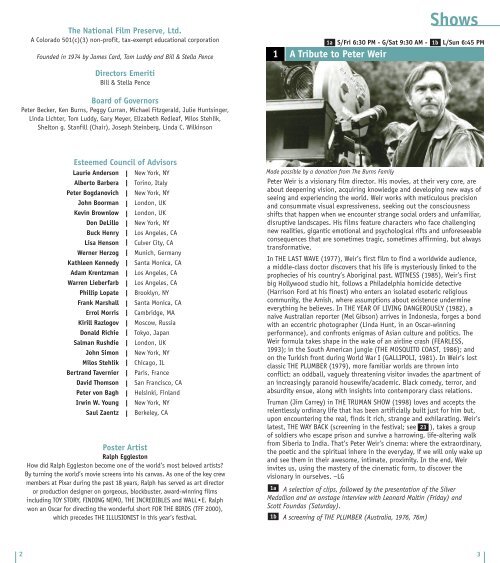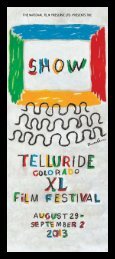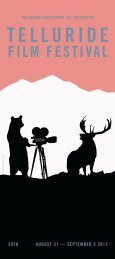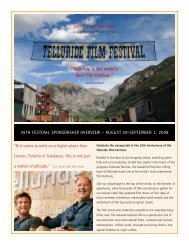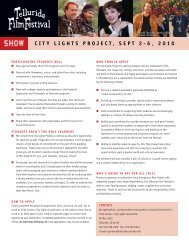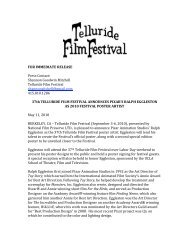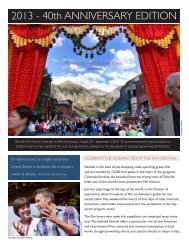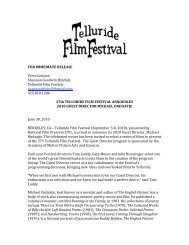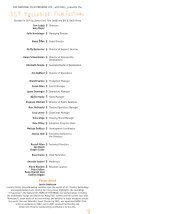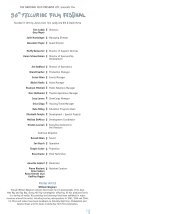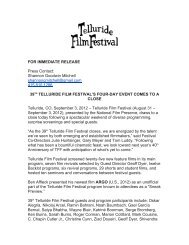Publications Editor Prized Program Contributors Tribute Curator
Publications Editor Prized Program Contributors Tribute Curator
Publications Editor Prized Program Contributors Tribute Curator
You also want an ePaper? Increase the reach of your titles
YUMPU automatically turns print PDFs into web optimized ePapers that Google loves.
The National Film Preserve, Ltd.<br />
A Colorado 501(c)(3) non-profit, tax-exempt educational corporation<br />
Founded in 1974 by James Card, Tom Luddy and Bill & Stella Pence<br />
Directors Emeriti<br />
Bill & Stella Pence<br />
Board of Governors<br />
Peter Becker, Ken Burns, Peggy Curran, Michael Fitzgerald, Julie Huntsinger,<br />
Linda Lichter, Tom Luddy, Gary Meyer, Elizabeth Redleaf, Milos Stehlik,<br />
Shelton g. Stanfill (Chair), Joseph Steinberg, Linda C. Wilkinson<br />
2<br />
Esteemed Council of Advisors<br />
Laurie Anderson New York, NY<br />
Alberto Barbera Torino, Italy<br />
Peter Bogdanovich New York, NY<br />
John Boorman London, UK<br />
Kevin Brownlow London, UK<br />
Don DeLillo New York, NY<br />
Buck Henry Los Angeles, CA<br />
Lisa Henson Culver City, CA<br />
Werner Herzog Munich, Germany<br />
Kathleen Kennedy Santa Monica, CA<br />
Adam Krentzman Los Angeles, CA<br />
Warren Lieberfarb Los Angeles, CA<br />
Phillip Lopate Brooklyn, NY<br />
Frank Marshall Santa Monica, CA<br />
Errol Morris Cambridge, MA<br />
Kirill Razlogov Moscow, Russia<br />
Donald Richie Tokyo, Japan<br />
Salman Rushdie London, UK<br />
John Simon New York, NY<br />
Milos Stehlik Chicago, IL<br />
Bertrand Tavernier Paris, France<br />
David Thomson San Francisco, CA<br />
Peter von Bagh Helsinki, Finland<br />
Irwin W. Young New York, NY<br />
Saul Zaentz Berkeley, CA<br />
Poster Artist<br />
Ralph Eggleston<br />
How did Ralph Eggleston become one of the world’s most beloved artists?<br />
By turning the world’s movie screens into his canvas. As one of the key crew<br />
members at Pixar during the past 18 years, Ralph has served as art director<br />
or production designer on gorgeous, blockbuster, award-winning films<br />
including TOY STORY, FINDING NEMO, THE INCREDIBLES and WALL•E. Ralph<br />
won an Oscar for directing the wonderful short FOR THE BIRDS (TFF 2000),<br />
which precedes THE ILLUSIONIST in this year’s festival.<br />
1 A <strong>Tribute</strong> to Peter Weir<br />
Shows<br />
1a S/Fri 6:30 PM - G/Sat 9:30 AM - 1b L/Sun 6:45 PM<br />
Made possible by a donation from The Burns Family<br />
Peter Weir is a visionary film director. His movies, at their very core, are<br />
about deepening vision, acquiring knowledge and developing new ways of<br />
seeing and experiencing the world. Weir works with meticulous precision<br />
and consummate visual expressiveness, seeking out the consciousness<br />
shifts that happen when we encounter strange social orders and unfamiliar,<br />
disruptive landscapes. His films feature characters who face challenging<br />
new realities, gigantic emotional and psychological rifts and unforeseeable<br />
consequences that are sometimes tragic, sometimes affirming, but always<br />
transformative.<br />
In THE LAST WAVE (1977), Weir’s first film to find a worldwide audience,<br />
a middle-class doctor discovers that his life is mysteriously linked to the<br />
prophecies of his country’s Aboriginal past. WITNESS (1985), Weir’s first<br />
big Hollywood studio hit, follows a Philadelphia homicide detective<br />
(Harrison Ford at his finest) who enters an isolated esoteric religious<br />
community, the Amish, where assumptions about existence undermine<br />
everything he believes. In THE YEAR OF LIVING DANGEROUSLY (1982), a<br />
naive Australian reporter (Mel Gibson) arrives in Indonesia, forges a bond<br />
with an eccentric photographer (Linda Hunt, in an Oscar-winning<br />
performance), and confronts enigmas of Asian culture and politics. The<br />
Weir formula takes shape in the wake of an airline crash (FEARLESS,<br />
1993); in the South American jungle (THE MOSQUITO COAST, 1986); and<br />
on the Turkish front during World War I (GALLIPOLI, 1981). In Weir’s lost<br />
classic THE PLUMBER (1979), more familiar worlds are thrown into<br />
conflict: an oddball, vaguely threatening visitor invades the apartment of<br />
an increasingly paranoid housewife/academic. Black comedy, terror, and<br />
absurdity ensue, along with insights into contemporary class relations.<br />
Truman (Jim Carrey) in THE TRUMAN SHOW (1998) loves and accepts the<br />
relentlessly ordinary life that has been artificially built just for him but,<br />
upon encountering the real, finds it rich, strange and exhilarating. Weir’s<br />
latest, THE WAY BACK (screening in the festival; see 23 2 ), takes a group<br />
of soldiers who escape prison and survive a harrowing, life-altering walk<br />
from Siberia to India. That’s Peter Weir’s cinema: where the extraordinary,<br />
the poetic and the spiritual inhere in the everyday, if we will only wake up<br />
and see them in their awesome, intimate, proximity. In the end, Weir<br />
invites us, using the mastery of the cinematic form, to discover the<br />
visionary in ourselves. –LG<br />
1a A selection of clips, followed by the presentation of the Silver<br />
Medallion and an onstage interview with Leonard Maltin (Friday) and<br />
Scott Foundas (Saturday).<br />
1b A screening of THE PLUMBER (Australia, 1976, 76m)<br />
3


